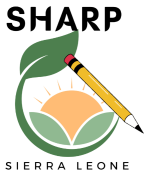
During the lockdown from COVID 19, SHARP Sierra Leone and Kids Can Make a Difference began a Solution to Hunger Farm. According to the World Food Program in Sierra Leone, around 5.1 million Sierra Leoneans are estimated to lack sufficient nutritious food to live a healthy life, with 789,536 of them being severely food insecure. Only one-fifth of the estimated 5.4 million hectares of arable land in Sierra Leone is used for agriculture.
Residents of the slum communities are living with hunger and poverty. The floods impact them by causing them to lose everything, and having to start over every year. With our many years of experience working with the flood affected victims, we learned that food and dry clothing were the most desperate need of the victims following each flood.
Finding a solution to the hunger problem in the slums was our project during the early waves of COVID 19. The food supply chain restrictions disrupted the market, and prices fluctuated as the demand rose and fell, causing widespread food shortages and starvation in the flood prone communities of Freetown. Board members of SHARP played a significant role in responding to these emergencies each time, with many bags of rice, vegetables, clothing, and sleeping sheets to supply to almost 100 families in this community.
SHARP and Kids Can Make a Difference, along with small holder farmers, began a farm on a 40 acres. Crops were planted, including tomatoes, corn, coconut, and peppers.
The seed loan initiative was begun for small older farmers. Many thanks to the founders of Kids Can Make a Difference. Jane and Larry Levine, and Mary Brownell have been the lead fundraisers on this farm project.
Deforestation and climate change are impacting our production, but we have been able to multiply seed loan supplies to small holder farmers across communities, practicing subsistence farming with limited local tools available.
SHARP and Kids Make a Difference have a vision to build a seed bank in the near future. We believe this will ensure seed security for farmers, and food security for the people.

